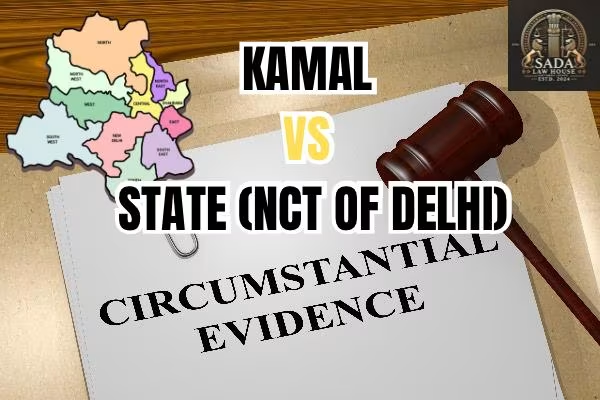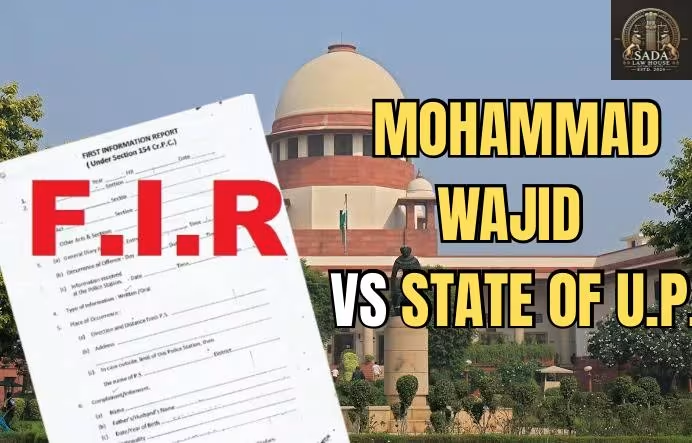KAMAL VERSUS STATE (NCT OF DELHI)
Trending Today KAMAL VERSUS STATE (NCT OF DELHI) MOHAMMAD WAJID VS STATE OF U.P. (2023) Union of India & Others v. K. Pushpavanam & Others (2023) S.S. Cold Storage India Pvt. Ltd v. National Insurance Co. Ltd (2023) Dev Gupta v. PEC University of Technology & Others (2023) Asma Shaw vs. The Islamia College of Science & Commerce, Srinagar & Others Hind Offshore Pvt. Ltd. v. IFFCO–Tokio General Insurance Co. Ltd. (2023) State of Karnataka Lokayukta Police v. S. Subbegowda (2023) M/s. Isnar Aqua Farms v. United India Insurance Co. Ltd. (2023) Jaipur Development Authority v. State of Rajasthan (2023) KAMAL VERSUS STATE (NCT OF DELHI) Reha Bhargav 16 October, 2025 Introduction This case pertains to a criminal appeal filed by Kamal (Appellant) challenging his conviction under Section 302 read with Section 34 of the Indian Penal Code (IPC) for murder. The trial court had convicted Kamal and two co-accused, and the Delhi High Court affirmed the decision. The prosecution’s case was built entirely on circumstantial evidence, as no direct eyewitnesses were available. The appellant contended that the conviction rested on weak and incomplete circumstantial evidence, and the chain of events was insufficient to conclusively establish guilt. The Supreme Court was called upon to decide whether the conviction could stand solely on such evidence and whether the courts below had erred in their findings. Facts of the Case The case involved the alleged murder of a man in Delhi, for which Kamal and two co-accused were charged under Section 302/34 IPC. The prosecution alleged that due to prior enmity, the accused jointly committed the murder with common intention. The evidence was entirely circumstantial, relying on: The deceased being last seen with the accused, Recovery of alleged incriminating materials, Call detail records (CDRs), and Forensic reports. The trial court held this evidence sufficient to convict, and the Delhi High Court upheld the conviction. Kamal then appealed to the Supreme Court, arguing that the prosecution failed to prove an unbroken chain of circumstances, and that crucial evidence was either unreliable or uncorroborated. Issues of the Case Whether Kamal’s conviction under Section 302/34 IPC was sustainable when based solely on circumstantial evidence? Whether the prosecution successfully established a complete and unbroken chain of circumstances leading only to the appellant’s guilt? Whether the “last seen together” theory and recovery of incriminating articles were sufficient to prove guilt beyond reasonable doubt in the absence of direct evidence? Whether the trial court and High Court erred in relying excessively on uncorroborated and weak evidence to convict the appellant? Petitioner’s Arguments The learned counsel for Kamal (Appellant) submitted that: The entire prosecution case was based on circumstantial evidence, with no direct eyewitnesses. The chain of circumstances was incomplete, failing to unerringly point to the appellant’s guilt. The “last seen together” theory was unreliable due to a wide and unexplained time gap between when the deceased was last seen and when his body was recovered. The recovery of incriminating articles was procedurally flawed and lacked credibility. The prosecution failed to establish a clear motive, which is essential in cases relying solely on circumstantial proof. Both lower courts misappreciated evidence and failed to apply the legal standards set in Sharad Birdhichand Sarda v. State of Maharashtra (1984) and other precedents. Hence, the defense urged that benefit of doubt should be extended to the appellant and the conviction set aside. Respondent’s Arguments The learned counsel for the State (Respondent) defended the conviction, contending that: The prosecution had established a consistent and convincing chain of circumstantial evidence. Though no eyewitnesses existed, the collective weight of the circumstances— the deceased last seen with the accused, recovery of incriminating articles, and forensic and call record corroboration—was sufficient to prove guilt beyond reasonable doubt. The motive was demonstrated through prior enmity and strained relations. Investigative procedures were properly followed, and the courts below had rightly appreciated the evidence.Thus, the State argued that the conviction under Section 302/34 IPC was legally sound and did not warrant Supreme Court interference. Judgment The Supreme Court re-evaluated the evidence and held that the conviction of Kamal was unsustainable. The Court found that: The prosecution’s case rested entirely on circumstantial evidence, yet the chain of circumstances was incomplete. The “last seen together” theory was weak because of the significant time gap between the last sighting and discovery of the body. The alleged recovery of incriminating materials lacked procedural integrity and corroboration. The prosecution failed to establish a clear motive, which is vital in cases of circumstantial evidence. Referring to Sharad Birdhichand Sarda v. State of Maharashtra (1984), the Court reiterated that each link in the chain of circumstances must be proven beyond reasonable doubt, and if any link is missing, the accused is entitled to the benefit of doubt. Accordingly, the Supreme Court: Allowed the appeal, Set aside the conviction and sentence, and Acquitted Kamal of all charges under Section 302/34 IPC. Conclusion The Supreme Court concluded that the prosecution failed to prove guilt beyond reasonable doubt. The chain of circumstances was incomplete, and key evidence such as the “last seen” theory and recovery of articles lacked credibility. The Court emphasized that in cases based purely on circumstantial evidence: Every link must be conclusive and consistent with the hypothesis of guilt. If reasonable doubt persists, the accused must be acquitted. Consequently, the Court ordered Kamal’s immediate release, if not required in any other case, bringing an end to prolonged incarceration and reaffirming the principle that suspicion, however strong, cannot replace proof. Leave a Reply Cancel Reply Logged in as Sada Law. Edit your profile. Log out? Required fields are marked * Message* Case Laws KAMAL VERSUS STATE (NCT OF DELHI) Sada Law • October 16, 2025 • Case law • No Comments MOHAMMAD WAJID VS STATE OF U.P. (2023) Sada Law • October 16, 2025 • Case law • No Comments Union of India & Others v. K. Pushpavanam & Others (2023) Sada Law • October 16, 2025 • Case law • No Comments 1 2 3 … 5 Next »
KAMAL VERSUS STATE (NCT OF DELHI) Read More »










